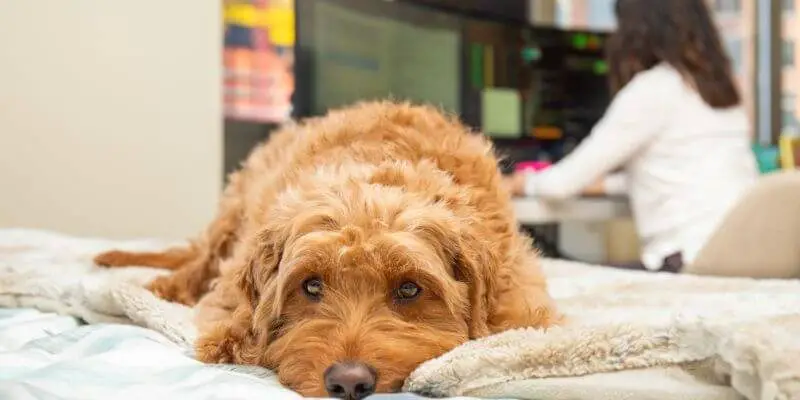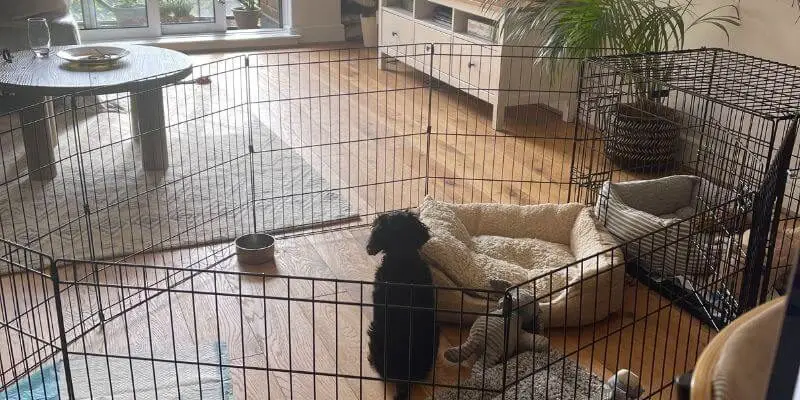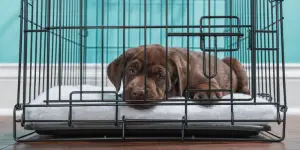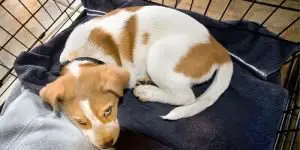
Working from home with a puppy
- Written by Joshua Gordon
- Last updated

Working from home with a puppy – Key takeaways
- Make a daily schedule for your puppy that fits around work
- Know what to expect from your puppy based on their age and breed
- Plan activities for your puppy during breaks to keep them stimulated
- Use toys and chews to occupy your puppy while your work
- Train your puppy to be more independent and how to behave appropriately
- Ask friends and family for support if necessary
In this article
How best to work from home with a puppy – the essential guide
Working from home is more popular than ever, and while it can be easier for some, it can prove challenging for puppy owners. Caring for a puppy itself can often feel like a full-time job, but when you have strict deadlines to follow or important conference calls to make, balancing both can be tough.
But don’t worry, working remotely and looking after a bouncing pup can be done, and this is where our handy guide comes in! We’ll be going over everything you need to know about working from home with a puppy so you can keep both your pooch and colleagues happy.
Plan a schedule that works for both you and your puppy
As you might already know, dogs thrive on routine, so it’s a great idea to compose a daily schedule for your puppy that fits around your job. For instance, if you start work at 9am, make sure you feed and take your puppy outside to potty before then.
Whenever you have a break, set some time aside for your pooch, whether that’s a short walk or a game of fetch. The benefit of working remotely is you get to choose your own hours and when you do things, so you should always be able to squeeze in a little bonding time with your pup.
If you’re struggling to plan your job around your puppy, below is a sample schedule to help you get started. Feel free to make adjustments to fit your lifestyle.
| Time | Activity |
|---|---|
| 7:30am | Take your puppy outside, make breakfast, and feed your puppy their first meal of the day. |
| 8:00am | Get ready for work, then a short walk with your pup around the block. |
| 9:30am | Start work. |
| 11:30am | Let your puppy outside to potty, take a short break, and then back to work. |
| 1:00pm | Lunch time for you and your puppy, then a potty break, and a bit of bonding time. |
| 1:45pm | Back to work. |
| 3:00pm | Let your puppy outside to potty and take a short break. |
| 6:00pm | Finish work, let your puppy outside, and feed your puppy their third meal. Spend the rest of the evening to unwind and play or cuddle with your pooch. |
Know what to expect from the age and breed of your puppy
All puppies act differently depending on their age and breed, so it’s worth looking up common traits and behaviors associated with both. If your puppy, for example, is only 8 weeks old, then it’s unfair to expect them to be fully potty trained or regularly listening to commands.
All dog breeds have certain characteristics that make them who they are, so try to make yourself aware of these. Breeds like Border Collies and Siberian Huskies, for instance, are extremely active, even as young dogs, so they can become destructive if they are not given enough daily exercise and mental stimulation.
Other dogs like Yorkshire terriers are known for being loud barkers, so this is something to keep in mind if you’re in a conference call.
Managing conference calls with a puppy
Setting up a conference call when you have a young puppy can be hard, especially as it means you can’t keep a close eye on your pooch. Puppies always seem to have a knack for getting into trouble, and dealing with this while you’re in the middle of a meeting can definitely have its challenges.
Communicate with your colleagues
If you haven’t so already, let your colleagues know you have a young puppy before you set up a conference call. That way, they’ll understand if you need to quickly leave the room to quieten your puppy down or stop them from doing something they’re not supposed to.
Give your puppy a treat or toy while you’re on a call
Before your conference call is due to start, give your puppy a toy to play with or a long-lasting treat to gnaw on to keep them occupied. Puzzle toys are particularly great as they mentally stimulate your puppy and reward them with a treat when they figure out the solution.
Reward your puppy’s good behavior
Dogs are more likely to repeat a behavior if they are rewarded for it, so if your puppy is quiet and behaving well during your conference call, make sure you praise them and give them a treat.
A tasty snack or a game of tug-of-war is sure to be greatly appreciated by your pooch, and they’ll begin to associate being calm during your meeting with a positive outcome!
Keeping your puppy happy and stimulated while you’re working
During a busy work day, there will be a lot of instances when you can’t give your puppy much attention, whether that’s because you need to stick to a strict deadline or organize meetings with your colleagues.
Puppies are much less independent than adult canines and will look to their caregiver for play and affection, especially if there are no other dogs in their household. You should make sure your puppy has things to do while you’re working and make a bit of time for your pooch when you have a break.
This allows you to have a productive day as well as keep your puppy happy and entertained.
Let your puppy play with interactive toys
Interactive dog toys such as electronic toys and treat dispensers are fantastic for keeping your puppy distracted when you’re unable to play with them. Dog lick mats are also beneficial and give your puppy something tasty to enjoy while you’re working

Plan activities for your puppy during scheduled breaks
During your work day, set some time aside for activities with your puppy, such as a game of fetch or a training session. It doesn’t have to take up half the day – a quick 10-minute activity every couple of hours, when you have a break, will be enough to keep your puppy entertained and tire them out so they’ll sleep easier at night.
Besides, it’ll give you something to look forward to after you’ve completed an important task or goal!
Go on short walks
Regular exercise is important for your puppy’s physical and mental well-being as it keeps its body and mind healthy.
Although the age and breed of your puppy will determine how much exercise they should get each day, you should always make sure your puppy receives at least one daily walk.
Before you start work or during your lunch break, take your pooch for a quick trek around the block or your local park. It will also give you the opportunity to stretch your legs and stay active!!
Make sure they’re up to date with their vaccinations if you plan on letting them meet other dogs.
Socialize your puppy
Socialization is crucial for your puppy’s development, especially in the first few months of its life, as it will mold the type of dog they become as an adult.
Poorly socialized dogs are more likely to have behavioral issues like anxiety and aggression, so the more things and experiences you introduce your pooch to, the more well-rounded and confident they will become.
Let your puppy meet strangers and other dogs on a regular basis (puppy classes are great for this) – you could schedule a catch-up with a friend during your lunch break so your puppy can work on their socialization skills.
On your daily walks, introduce your puppy to a variety of new smells, sights, and sounds, such as cyclists, buggies/prams, busy roads, etc.
Allow time for cuddles and attention
Similarly to setting time aside in your work schedule for activities and walks to do with your puppy, you should dedicate a free period for bonding.
Even if it’s just a brief cuddle on the couch while you check your emails or reply to your workgroup chat, giving your puppy some love and attention will help them become closer to you.
Puppy behavior
Puppy behavior differs based on their stage of development, but even pups as young as 6 weeks old can benefit from simple training.
Train your puppy to be independent
Although puppies are more reliant on their caregivers than adult dogs, that doesn’t mean you can’t begin training them to be more independent. This will come in handy when you’re busy at work or running errands.
A good example to help your puppy be less dependent on you is to ignore your pooch when you first enter or leave a room, particularly after being out of the house.
Only approach your puppy when they are calm and quiet.
Do obedience training
All puppies should undergo obedience training, even if it’s just a simple command like “wait” or “sit” to begin with. You should set clear boundaries for your puppy from the get-go and remain consistent with them.
For instance, if you don’t want your puppy jumping at strangers, teach them this from an early age. Don’t ignore the behavior one time, then scold them the next, as this will just confuse them!
It’s much harder to break bad habits once they’ve become ingrained in your puppy, so try not to let bad behaviors get a chance to develop in the first place.
Do not bend to their whining
It can be difficult to ignore a whining puppy, but provided you know their vocalizations are out of frustration or due to not receiving attention, don’t give in!
Only give your puppy affection when they are quiet so they learn that being calm and well-behaved means you’ll return quicker.
As always, make sure your puppy isn’t crying because they’re hungry, thirsty, need the toilet, are unwell, etc.

Consider crate training your puppy
Crate training can be beneficial for housebreaking your puppy as dogs don’t usually like to soil where they sleep. A crate also provides your puppy with a safe, confined area for when you can’t keep an eye on them, such as when you’re working.
You’ll need to build up your puppy’s confidence around the crate, so allow them to spend a small amount of time in the crate by themselves, then gradually increase the duration. Make sure you reward your puppy for being relaxed and quiet inside the crate so they view it as a positive.
We have a separate article on how to stop your puppy from crying in their crate if you’re looking for more information on this topic.
Ask for assistance from friends and family
Working from home and caring for a puppy is no easy feat, so if you find yourself struggling, don’t be afraid to ask for support from friends and family.
Ask whether they can keep an eye on your puppy for a couple of hours while you work or take them on a short walk to help you catch up on your daily tasks.
If your friends or family are unavailable to help you watch your puppy, consider hiring a dog walker or take a look at doggy daycare services.
Set up an office space
Setting up an office space for you to work in at home can be advantageous as it provides you with a place exclusively for job-related tasks, which may help you be more productive.
Get your puppy used to seeing you work in your office – it might be a good idea to only interact with your puppy in work-free zones such as the living room. That way, your puppy will know that when you’re in your office, it’s not the time to play!
Final thoughts
Working from home with a puppy isn’t without its challenges, but it definitely isn’t as hard as it might seem, especially if you make a schedule to help you balance the two.
While it’s important not to let caring for your puppy negatively impact your work, you should also make sure you dedicate time to your puppy’s needs and happiness each day!
References
https://www.poochandmutt.co.uk/blogs/puppy/top-tips-to-survive-working-at-home-with-a-puppy
https://dogtime.com/lifestyle/51801-survival-guide-dog-parents-work-home
https://www.petmd.com/dog/slideshows/7-dangers-not-socializing-your-dog
https://www.akc.org/expert-advice/training/why-crate-training-is-great-for-your-dog/

Written by: Joshua Gordon
Head of Research and Editorial, Joshua has over 7 years of experience as a finance and automotive research consultant. He is a childhood pet owner and dog enthusiast.









